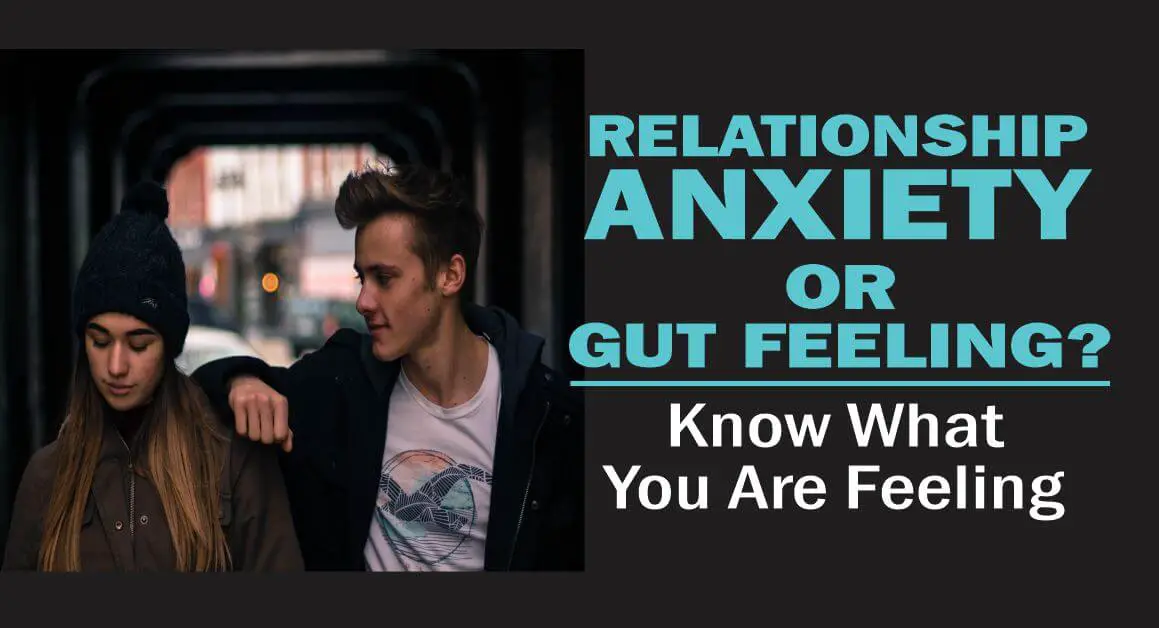How do you know if what you feel in your romantic relationship is relationship anxiety or gut feeling? Find out the differences as both and mimic each other.
Are you torn between the whispers of your gut feeling and the relentless grip of relationship anxiety?
It’s a common struggle that many individuals face when navigating the complexities of love and connection.
Is it merely fear and insecurity that fuels your doubts, or is there a deeper wisdom guiding your intuition and prompting you to take action?
This action could be to pay more attention to your partner or to even know when to walk away from the relationship.
I remember in my first relationship a little bit above 20 and I always had this gnawing anxiety that never went away.
I will always find a problem with all dates and it never always ends well. It was later I understood my insecurity, worked on myself and went ahead to have meaningful relationships.
I overcame my insecurity and anxiety with age and exposure.
However, not everyone would snap out of this conundrum without frustration.
Relationship anxiety and gut feeling would surely have a field day, but your ability to identify them and handle them accordingly will be the edge you will have.
In this article, we are going to discuss in-depth, relationship anxiety and the familiar power of gut feelings and at the end, you will be able to identify which of them you feel and how to approach it.
Related: Addressing Insecurity and Doubts in Relationships
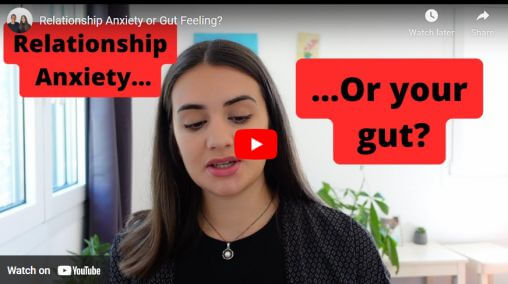
Understanding Relationship Anxiety and Gut Feeling

Relationship Anxiety in Relationships
Relationship anxiety is a state of anxiety or fear that you experience in a romantic relationship.
It involves excessive worrying, insecurity, and fear of abandonment or rejection, which can negatively impact the individual and the relationship.
Relationship anxiety is mostly triggered by a lack of continuous assurance or an unresolved suspicion.
The DSM-V – a diagnostic tool used by mental health professionals to identify disorders like anxiety, lists the specific symptoms of general anxiety, which include excessive worry and anxiety, difficulty controlling the worry, and physical symptoms like restlessness, fatigue, difficulty concentrating, irritability, muscle tension, and trouble sleeping.
Anxiety in relationships and insecurity can occasionally be exacerbated by poor self-worth or low self-esteem. According to a study, people who have lower self-esteem are more prone to question their partner’s emotions when they are feeling insecure. This is a form of projection that might occur.
For instance, it can be simpler for you to think that your partner has the same opinion of you when you are feeling worthless.
Related: Why Emotional Intuition Matters
Gut Feeling in Relationships
A gut feeling on the other hand is an instinctual or intuitive response that often arises spontaneously and without conscious reasoning.
It is often described as a deep, inner knowing or a strong sense of certainty about something, even if there is no logical explanation for it.
According to clinical psychologist Dr. Helen Odessky, “Your gut is your own wisdom.” “You might be reluctant to act on it, but it feels certain, in contrast to the uncertainty that fear feels like.”
In relationships, gut feelings can provide valuable insights and guidance, helping you make decisions and navigate interactions with others.
Related: Understanding The Balance Of Control in Relationships
Why Relationship Anxiety and Gut Feeling Mimic Each Other

Relationship anxiety and gut feeling can mimic each other because they both involve the experience of uncertainty and a heightened emotional state.
Sometimes, relationship anxiety can make it challenging to differentiate between genuine gut feelings and irrational fears.
The heightened emotional state and fear of being hurt in a relationship can make it difficult to trust your instincts.
It may lead to second-guessing gut feelings and questioning whether they are based on actual intuition or simply a product of anxiety.
It is important for individuals experiencing relationship anxiety to work on self-reflection and building self-esteem to better distinguish between irrational fears and genuine gut feelings.
Related: Dangers Of Trusting Your Gut
Difference between Relationship Anxiety and Gut Feeling
On one hand, anxiety can be a constructive and beneficial emotion that helps us identify potential problems or conflicts in our relationship.
On the other hand, excessive anxiety or baseless feelings of unease can create unnecessary stress and strain on our relationship, potentially leading to the very issues we were afraid of in the first place.
At the same time, gut feelings can be a useful tool for navigating our romantic lives, as they can alert us to deeper truths or insights that might not be immediately apparent.
However, these intuitions can also be misguided or tainted by our own biases and fears, leading us down a path that doesn’t ultimately serve us.
In this context, finding a healthy balance between relationship anxiety and gut feelings is key.
By learning to identify and differentiate between these two emotional states, we can make more informed and grounded choices about our romantic lives, fostering healthier and more fulfilling connections in the process.
Related: Signs of Fear of Intimacy in Relationships
Relationship Anxiety vs. Gut Feeling
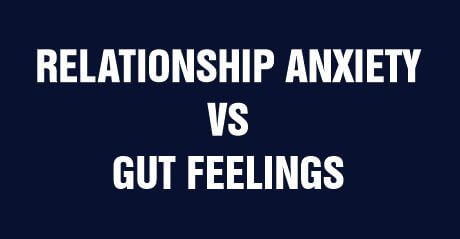
Navigating the gray area in a relationship can be challenging, especially when it comes to distinguishing between relationship anxiety and gut feelings.
While both experiences can be valid and informative, it’s important to understand the difference between the two in order to make informed decisions about the future of the relationship.
Here are some considerations to make so that you can identify if what you feel is relationship anxiety or gut feeling.
| Relationship Anxiety | Gut Feeling |
|---|---|
| Constant worrying about the relationship | Immediate sense of unease or discomfort |
| Fear of being abandoned or rejected | Strong intuition or instinct about the relationship |
| Overthinking and analyzing the relationship | Intuitive sense of trust or distrust |
| Feeling insecure or doubtful about the partner’s feelings | A clear sense of compatibility or incompatibility |
| Seeking reassurance and validation from the partner | Inner sense of peace or unrest |
| An inner sense of peace or unrest | Subconscious awareness of red flags or warning signs |
| Self-doubt and questioning the suitability of the relationship | A deep sense of knowing or certainty |
| Excessive need for control or certainty in the relationship | Implicit understanding of the relationship’s dynamics |
| Struggles with communication and expressing emotions | Fluent understanding of unspoken cues or signals |
| Negatively impacts mental well-being and overall happiness | Enhances intuition and fosters emotional alignment |
Emotional vs. Rational
Relationship anxiety is predominantly emotional, meaning it is driven by intense feelings and emotions such as fear, insecurity, and doubt about the relationship.
It is often fueled by irrational thoughts and beliefs about the partner or the relationship.
On the other hand, gut feelings involve a mix of emotion and rationality.
They are often described as a strong intuitive sense or a deep-seated feeling that something is either right or wrong.
Gut feelings may arise from an unconscious processing of information and cues that the rational mind may not be fully aware of.
They can be influenced by past experiences, but they are not solely driven by emotion.
Related: Are Women’s Intuition More Powerful Than That Of Men?
Consistency and Patterns
Relationship anxiety may stem from specific triggers, such as fear of abandonment or infidelity, or it may be a more generalized fear about the relationship’s future.
It can fluctuate in intensity and may not always be consistent. Relationship anxiety can also manifest in different ways and may not necessarily follow a clear pattern of behavior.
In contrast, gut feelings are often consistent and linked to patterns of behaviour.
For example, if you consistently feel uneasy or distrustful around a particular person or in certain situations, your gut feelings may indicate that something is wrong.
Gut feelings are not easily swayed by temporary emotions or circumstances and tend to persist over time.
Related: I Feel He’s Cheating, But no Evidence
Past Experiences
Relationship anxiety can be influenced by past relationship trauma or negative experiences.
It may stem from unresolved issues or repetitive patterns observed in previous relationships.
This anxiety often manifests as fear of being hurt, abandoned, or betrayed, and it can impact the person’s ability to trust and feel secure in their current relationship.
In contrast, gut feelings are more instinctual and not necessarily connected to past events.
They can be based on a subconscious processing of information and cues obtained from the environment, without any direct link to past experiences.
Gut feelings can be regarded as a form of intuition, guiding individuals based on instinct rather than conscious memory or logical reasoning.

A Situation Example of Relationship Anxiety between Lovers
Here is a scenario to let you understand if what you are feeling is relationship anxiety or gut feeling.
Sarah and John have been dating for several months and have developed a strong emotional connection to each other.
However, Sarah begins to experience relationship anxiety. She constantly over-analyses worries about the future of their relationship and whether John truly loves her.
Sarah’s relationship anxiety arises from her past experiences of being hurt and betrayed in previous relationships.
She constantly seeks reassurance from John, questioning his love and commitment.
She frequently worries about his interactions with other people, thinking he might be attracted to someone else or might leave her for someone better.
As she considers all the possible ways her relationship could end, According to NIH her fear could turn into unhealthy tension and prevent her from being in the moment.
John, on the other hand, is patient and understanding of Sarah’s anxiety. He knows that her fears are not based on their actual relationship but stem from past emotional traumas.
He tries his best to reassure her by showing his love through affectionate gestures, spending quality time together, and expressing his feelings verbally.
Despite her partner’s efforts, Sarah’s relationship anxiety often creates tension between them.
She may become distant or insecure, leading to miscommunications and arguments.
Sarah realizes that her anxieties are affecting their relationship and seeks counseling to work through her past traumas and develop coping mechanisms to manage her anxiety better.
Through therapy and open communication, Sarah begins to overcome her relationship anxiety.
She learns to trust in John’s love, believes in their connection, and shifts her focus from worrying about the future to enjoying the present together.
In turn, their relationship grows stronger, and they both feel more secure and satisfied in their love for each other.
Related: Building Emotional Intimacy With Your Partner
A Situation Example of Gut Feeling in a Relationship

Emily had been dating John for several months and everything seemed to be going great.
They had a strong connection, enjoyed each other’s company, and had open and honest communication.
However, recently Emily started to have a gut feeling that something was off.
She couldn’t pinpoint it exactly but she felt a sense of unease whenever she was with John.
Despite not having any concrete evidence or reasons to doubt their relationship, Emily decided to trust her gut feeling and address it with John.
They sat down and had an open and honest conversation about their feelings and concerns.
It turned out that John had been feeling distant and unsure about their future together.
By trusting her gut feeling and addressing it with John, Emily was able to create an opportunity for them to have a deeper conversation about their relationship.
This allowed them to address the underlying issues and work together to find a solution.
In the end, their relationship became stronger as they were both willing to listen to their gut feelings and take action.
The different situations above clearly show how relationship anxiety and gut feeling are different from each other.
Now let’s see how you can cope with whichever you identify as a problem in your relationship and how you can handle them.
How to Handle Relationship Anxiety and Gut Feeling in a Relationship
| Handling Relationship Anxiety and Gut Feelings in a Relationship |
|---|
| 1. Identify the Source of Anxiety It’s important to reflect on the root cause of your anxiety. Is it related to past experiences, insecurities, or doubts about your partner’s behavior? Understanding the source can help address it more effectively. 2. Communicate with your Partner Open and honest communication is key. Share your feelings and concerns with your partner in a calm and rational manner. Allow them to provide reassurance or address any issues that may be causing your anxiety. 3. Seek Professional Help if Needed If your anxiety is persistent and affecting your everyday life or relationship, consider reaching out to a therapist or counselor. They can provide guidance and equip you with tools to manage relationship anxiety effectively. 4. Practice Self-care Take care of yourself physically, mentally, and emotionally. Engage in activities that make you happy, reduce stress, and promote a sense of well-being. Prioritize self-love and self-confidence to maintain a healthy mindset in the relationship. 5. Trust your Gut Feeling Pay attention to your intuition. Gut feelings are often signals that something may be off in the relationship. While it’s important not to let anxiety control your thoughts, honoring your intuition can help you evaluate the situation objectively and make informed decisions about your relationship. 6. Assess the Relationship Dynamics Reflect on the overall dynamics of the relationship. Are both partners invested? Are there consistent efforts to maintain a healthy connection? Trustworthy and reciprocal actions can help alleviate anxiety and build a solid foundation in the relationship. 7. Avoid Overthinking and Catastrophizing Overthinking and imagining worst-case scenarios can fuel relationship anxiety. Practice mindfulness and challenge negative thoughts. Focus on the present moment and avoid jumping to conclusions without concrete evidence. 8. Develop Coping Strategies Explore coping mechanisms that work well for you when anxiety arises. This can include deep breathing exercises, journaling, mindfulness practices, or engaging in hobbies that promote relaxation and stress reduction. Experiment and find what works best for you. 9. Build a Support Network Surround yourself with supportive friends and family members who can provide a listening ear and offer valuable advice. Sharing your concerns with trusted individuals can help provide perspective and create a sense of reassurance. 10. Reevaluate the Relationship if Necessary If your relationship anxiety persists despite efforts to manage it, evaluate if the relationship is serving your well-being. Sometimes, ending a toxic or incompatible relationship may be a healthier choice in the long run. Trust your judgment and prioritize your happiness and emotional well-being. |
How to have a Good Relationship Despite Relationship Anxiety or Gut Feeling
Having a good relationship despite relationship anxiety and gut feelings can be challenging, but it is possible with some understanding and effort. Here are some steps to consider:
Understand Relationship Anxiety: It is essential to recognize the root causes of your relationship anxiety. Explore past experiences, fears, and insecurities that may be contributing to this anxiety. By understanding these triggers, you can start to work on managing them better.
Communicate Openly: Honest and open communication is crucial in any relationship. Talk to your partner about your anxiety and gut feelings. Let them know how it affects you and the potential impact on your relationship. Sharing your concerns can help both of you find ways to support each other.
Seek Professional Help: Consider seeking therapy or counseling to address your relationship anxiety. A professional can provide guidance, techniques, and tools to manage and overcome anxiety. They can also help you understand your gut feelings better and differentiate between intuitive warnings and anxiety-driven thoughts.
Related: How To Listen To Your Intuition In Relationships
Practice Self-care: Taking care of your mental and emotional well-being is vital. Engage in activities that help reduce anxiety, such as exercise, mindfulness, meditation, or journaling. Focus on building your self-esteem and self-confidence to mitigate the negative impact of relationship anxiety.
Trust and Boundaries: Work towards developing trust and setting healthy boundaries with your partner. Trust is built over time and through consistent actions. Establish clear boundaries that both of you can respect to ensure emotional safety within the relationship.
Related: 8 Irresistible Qualities Women Find Most Attractive In Men
Reflect on the Source of Gut Feelings: Gut feelings can be a valuable intuition mechanism, but also sometimes influenced by anxiety. Reflect on the reasons behind your gut feelings. Is there a pattern? Is it based on concrete evidence or mere fear? Take time to evaluate and assess whether your gut feelings are warranted or need to be addressed.
Practice Positive Thinking and Gratitude: Cultivating positive thinking patterns can help combat relationship anxiety. Focus on the positive aspects of your relationship, like the love, support, and growth you experience together. Practice gratitude by expressing appreciation for your partner and the things that make your relationship special.
Take it Slow: If you’re starting a new relationship or going through a difficult time, take things at a pace that is comfortable for you. Rushing can trigger anxiety and make it harder to differentiate between gut feelings and anxious thoughts. Allow yourself time to build trust, get to know your partner, and gradually deepen the connection.
Related: Overcoming Possessiveness in Relationships, Guide for Partners
How Gut Feelings Can Be Impaired by Anxiety

In romantic relationships, anxiety can impair gut feelings by causing individuals to misinterpret their partner’s actions and intentions.
When we are anxious, our attention is often focused on potential threats, which can make it difficult to accurately perceive and interpret our partner’s behavior.
This can lead to feelings of insecurity, jealousy, and mistrust, which can further exacerbate anxiety.
Related: Understanding Relationship Dynamics Between Partners
For example, if an individual is anxious about their partner’s commitment to the relationship, they may misinterpret their partner’s actions as evidence of disinterest or infidelity.
This can cause them to feel anxious and insecure, which can further impair their ability to accurately perceive their partner’s intentions.
Additionally, anxiety can cause individuals to engage in behaviors that are not in their best interest, such as avoiding conflict or suppressing their emotions.
This can lead to a breakdown in communication and intimacy, which can further escalate anxiety and impair gut feelings.
Related: Reasons Why Long-Distance Relationships Fail
Here is a screenshot of an answer I came across on Quora. A bad “gut” feeling in a relationship, what could it mean?
A lady Umarah Kay answered thus:
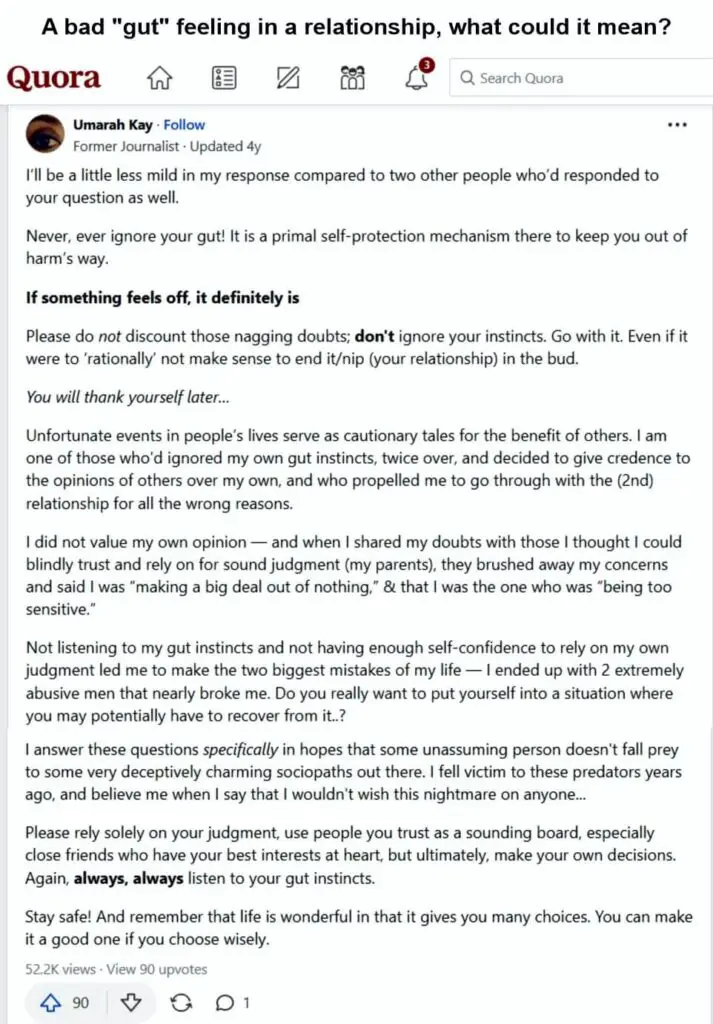
Another user, Charles Yawn also has this to say:
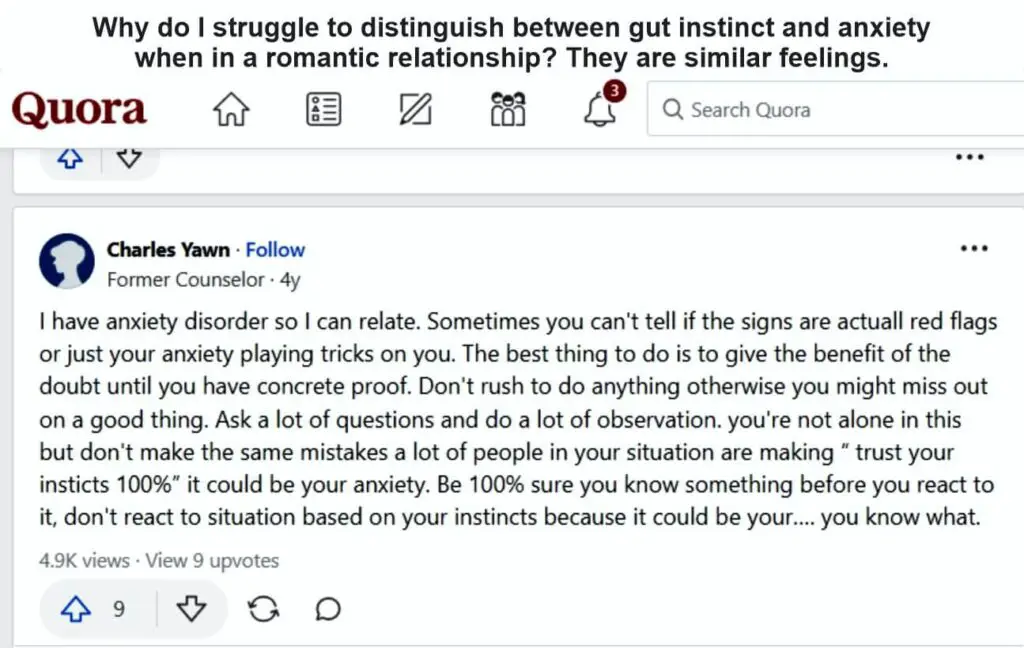
Also, Gwen S gave an opinion:
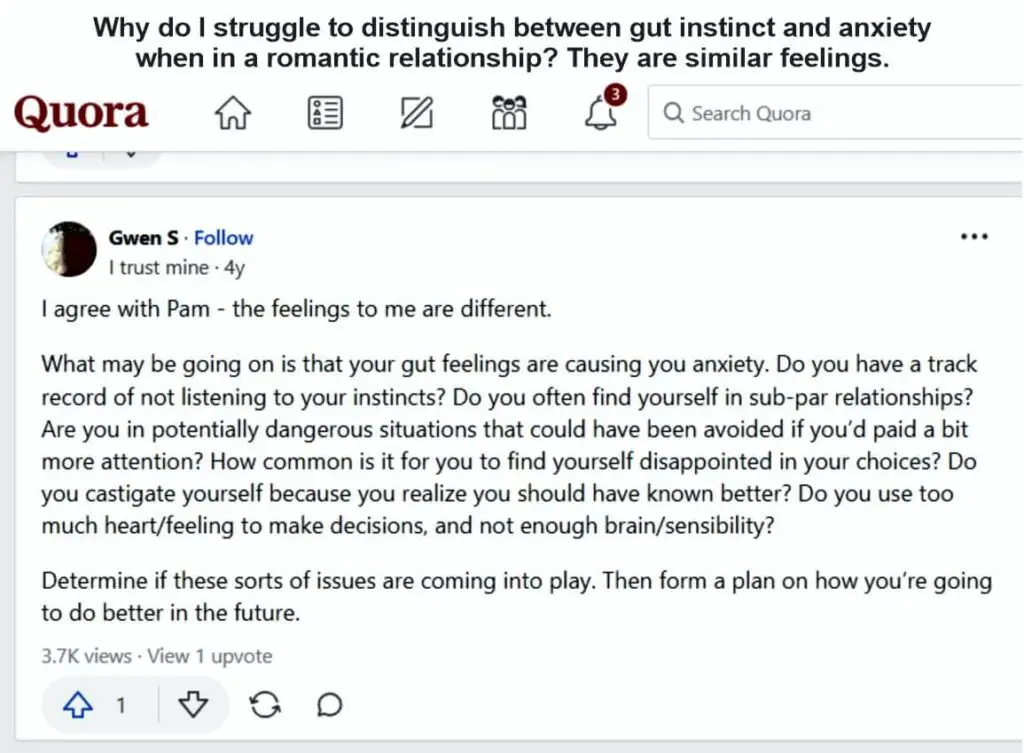
Related: Why You Are Being Exploited in A Romantic Relationship
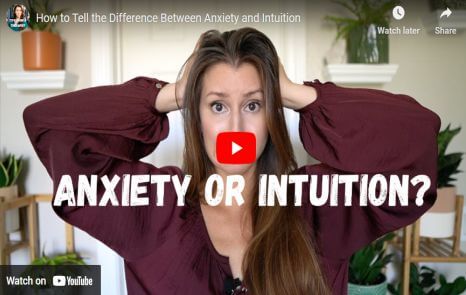
Frequently Asked Questions
Can anxiety be mistaken for gut feeling?
Yes, anxiety can sometimes be mistaken for a gut feeling, as intense emotions and uncertainty can blur the lines between intuition and anxious thoughts.
Is my relationship bad or am I just anxious?
It’s important to assess whether your relationship is genuinely unhealthy or if anxiety is amplifying your concerns. Seeking professional guidance can help clarify the situation.
How do you know if it’s a gut feeling or fear?
Distinguishing between a gut feeling and fear requires self-reflection. Gut feelings often feel instinctive and aligned with your values, while fear tends to be driven by worry and negative thoughts.
How can I differentiate between a gut feeling and relationship anxiety?
Gut feelings are often immediate responses to a situation, while relationship anxiety tends to persist over time, causing worry and fear regardless of the situation’s relevance.
Can relationship anxiety be beneficial in a relationship?
While some level of concern is normal, excessive relationship anxiety can strain the relationship. It is important to address and manage anxiety for a healthier partnership.
How can I trust my gut feelings in relationships?
Trusting your gut feelings involves self-reflection, recognizing patterns, and listening to your intuition. It is important to balance gut feelings with rational thinking and open communication with your partner.
Final Thoughts
In relationships, understanding if relationship anxiety or gut feeling is causing havoc can be difficult.
This article has thrown enough light on the importance of self-awareness and emotional intelligence in discerning the truth.
The key lies in finding a balanced approach that allows one to trust their instincts while also considering the impact of anxiety.
By developing these skills, individuals can foster healthy and fulfilling romantic lives, grounded in both intuition and rationality.
REFERENCES:
- Relationship Anxiety
- Commitment Issues in Relationships
- The Difference Between Gut Instinct, Anxiety & Intuition
- Relationship Anxiety: Intuition or Fear?
Pious Clements is the insightful voice behind "The Conducts of Life" blog, where he writes about life ethics, self-development, life mastery, and the dynamics of people and society.
With a profound understanding of human behaviuor and societal dynamics, Pious offers thought-provoking perspectives on ethical living and personal growth.
Through engaging narratives and astute observations, he inspires readers to navigate life's complexities with wisdom and integrity, encouraging a deeper understanding of the human experience and our place within society.
